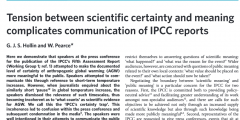Unmuting the message: Climate communication in a complex world
July 1, 2025
A few weeks ago Shanshan Zhang, Senior Scientific Editor at One Earth, Cell Press, asked me to write something about climate change communication, a topic I have been grappling with for a long time. At first I hesitated, but she really encouraged me and I am glad I wrote something. My little piece became part …
Tipping point
September 16, 2022
Over the past 15 years or so, the use of the term ‘tipping point’ has exploded in the scientific literature. My current interest was sparked by a new paper on tipping points published in Science. The lead author is David Armstrong McKay, a University of Exeter Earth systems scientist, and the paper is an update …
Extreme event/weather communication
May 27, 2022
Communication sciences span a large array of fields and issues. We have science communication, risk communication, crisis communication, health communication, and, of course climate change communication. Over the last few years, it has become clear to me that when it comes to climate and weather, all these communication efforts converge and become part of what …
The IPCC report: Impacts, adaptation and vulnerabilities
March 4, 2022
When I think about the latest IPCC report, which came out on 28 February, these sentences come to my (German) mind: Eintritt streng verboten! Eintritt strengstens verboten!! Eintritt allerstrengstens verboten!!! (Entry strictly forbidden. Entry very strictly forbidden. Entry extremely strictly forbidden.) These words are written on warning signs that adorn three doors in the classic …
IPCC reports, climate change and language work
September 6, 2021
This blog post is not about climate change communication. It is about what I call the ‘language work’ carried out by scientists when writing the various IPCC reports. Introduction On 9 August 2021 the first part of the Sixth Assessment Report of the Intergovernmental Panel on Climate Change, namely the Contribution of Working Group 1 …
What is a climate change communicator to do?
July 25, 2019
In a recent article, social scientists claim that a rhetoric of deadlines to urge action on climate change is ‘dangerous’. While I agree that it might be dangerous to get into a situation where you extend deadlines forever if you cannot achieve them, setting no deadlines at all may make it difficult to talk about …
Are we all alarmists now?
July 13, 2018
Over the years I have written many posts about extreme weather events on the one hand and quite a few on so-called alarmism on the other. This was in the context of working on issues related to climate change communication. Some years ago, when writing an article on communicating climate change, I included a sentence …
Science/climate communication: A view from reception theory
September 28, 2017
There has been some controversy recently surrounding a paper published in Nature Geoscience on global warming or, if I understand things correctly, about whether there might be a slightly better chance of avoiding it. This paper appears to have been misunderstood, misrepresented and misreported. One Mail Online headline read: “Fear of global warming is exaggerated, …
Methodological clarity required when publishing social science in natural science journals
October 23, 2015
This is a joint post with Greg Hollin. The latest issue of Nature Climate Change features a Correspondence from Peter Jacobs and colleagues which concerns a recent Letter that appeared in the same journal; our Reply is also published. We do not wish to deny that there are real and significant differences between ourselves and …
The crucial role of culture in climate change
September 5, 2015
On Wednesday, I attended the US Ambassador’s ‘digital dialogue’ event on climate change at Winfield House, where policy wonks, journalists, NGO representatives and academics discussed their current hopes and frustrations. Beyond the usual grumbles about ‘bogus arguments’ against climate action, it was pleasing that some attendees outside of the social sciences chose to highlight the key role of cultural …










